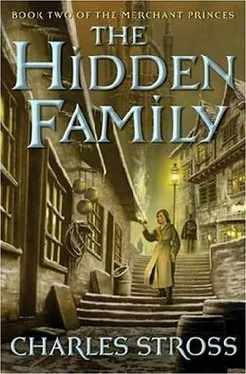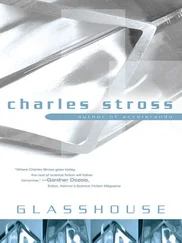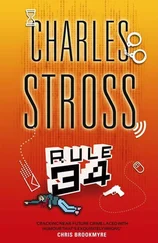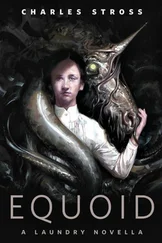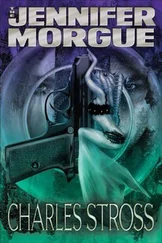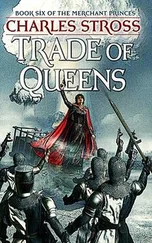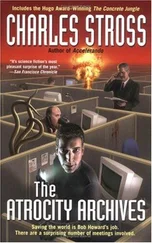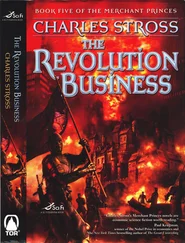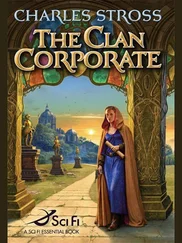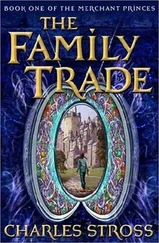“Hah.” Brilliana’s expression was pessimistic. “They let the fire run low, I’d say.” She found the chamber pot. Miriam nodded and looked away. So much for en suite bathrooms, she thought mordantly. “You stand up, now,” Brill ordered after a minute.
“Okay. How do I look?” asked Miriam.
“Hmm. I think you will pass. Don’t brush your hair until we are out of sight, though. It’s too clean to be seen in daylight, from all those marvelous soaps everyone uses on the other side, and we don’t want to attract attention. Humph. So what shall we do today, my lady?”
“Well, I think we’ll start by eating breakfast and paying the nice man.” Nice was not an adjective Miriam would normally use on a hotelier like the one lurking downstairs—back home she’d be more inclined to call the police—but standards of personal service varied wildly in the Gruin-markt. “Let’s hit the road to Hasleholm. As soon as we’re out of sight, I’m going to vanish. You remembered your pistol?”
Brill nodded.
“Okay, then you’re set up. It should just be a quiet day’s walk for you. If you run into trouble, first try to get off the road, then shoot—I don’t want you taking any chances, even if there isn’t much of a bandit problem around these parts in winter. Luckily you’re more heavily armed than anyone you could possibly meet except a Clan caravan.”
“Right.” Brill nodded uncertainly. “You’re sure that strange contraption will work?”
Miriam nodded. “Trust me.”
Breakfast below consisted of two chipped wooden bowls of oatmeal porridge, salted, eaten in the kitchen under the watchful (if squinting) eyes of the publican’s wife—which made it harder for Miriam to palm her pills. She made a song and dance of reciting some kind of grace prayer over the bowls. Miriam waited patiently, moving her lips randomly—her mute and incomprehending condition explained by Brill, in her capacity as long-suffering daughter.
Barely half an hour later, Miriam and Brill were on the road again, heading toward the coast, breath steaming in the frigid morning air. It was bitterly dry, like an icy desert. A heavy frost had fallen overnight, but not much snow. Miriam hunched beneath a heavy canvas knapsack that held her bicycle and extra supplies. Brill, too, bore a heavy bag, for Miriam had made two trips through to cache essential supplies before they began this trip. Although they’d come only two miles from Paulette’s house, they were centuries away in the most important way imaginable. Out here, even a minor injury such as a twisted ankle could be a disaster. But tiiey had certain advantages that normally only the Clan and its constituent families would have—from their modern hiking boots to the hefty automatic pistol Brill carried in a holster concealed beneath her Thinsulate-lined cloak.
“This had better work.” Miriam’s teeth chattered slighly as she spoke. “I’m going to feel really stupid if it turns out that this locket doesn’t work here, either.”
Brill said pragmatically, “My mother said you could tell if they’re dead. Have you looked at it since we came through?”
“No.” Miriam fumbled in her pouch for it. It clicked open easily and she shut it at once. “Ick. It’ll work, alright, if I don’t spill my guts. It feels rougher than the other one.”
Frozen leaf skeletons crunched beneath their boots. The post house was soon out of sight, the road empty and almost untraveled in winter. Bare trees thrust limbs out above them, bleak and barren in the harsh light of morning. “Are we out of sight, yet?” asked Miriam.
“Yes.” Brill stopped walking. “Might as well get an early start.”
Miriam paused beside her. She shuffled her feet. “Don’t wait long. If I don’t return within about five minutes, assume it means everything’s alright. Just keep walking and I’ll join you at the post house. If you hear anyone coming on the road, hide. If I’m late, wait over for one day then buy a horse or mule, head for Fort Lofstrom, and ask to be taken to Angbard. Clear?”
“Clear.” For a moment Brill froze, then she leaned forward and embraced Miriam. “Sky Father protect you,” she whispered.
“And you,” said Miriam, more surprised than anything else. Abruptly she hugged Brill back. “Take care.” Then she pulled away, pulled out the assassin’s locket, and stood in the middle of the road staring into its writhing depths.
* * *
It was twelve o’clock, and all the church bells in Boston were chiming noon.
The strange woman received nothing more than covert glances as she walked along The Mall, eyes flickering to either side. True, she wore a heavy backpack—somewhat singular for a woman—and a most peculiar cap, and her dress was about as far from fashionable as it was possible to be without street urchins harassing her with accusations of vile popery; but she walked with an air of granite determination that boded ill for anyone who got in her way.
Traffic was light but fast, and she seemed self-conscious as she looked both ways repeatedly before crossing the street. An open Jolly-car rumbled past behind her, iron wheels striking sparks from the cobblestones. There was a burst of raucous laughter from the tars within, returning to the North Station for the journey back to the royal dockyards. She dodged nimbly, then reached the safety of the sidewalk.
The pedestrian traffic was thicker near the fish market and the chandlers and other merchant suppliers. The woman glanced at a winter chestnut seller, raised her nose as she sidestepped a senescent pure-collector mumbling over his sack of dogshit, then paused on the corner of The Mall and Jefferson Street, glancing briefly over one shoulder before muttering into her scarf.
“Memo: This is not Boston—at least, not the Boston I know. All the street names are wrong and the buildings are stone and brick, not wood or concrete. Traffic drives on the left and the automobiles—there aren’t many—they’ve got chimneys, like steam locomotives. But the signs are in English and the roads are made of cobblestones or asphalt and it feels like Boston. Weird, really weird. It’s more like home than Niejwein, anyway.”
She carried on down the street, mumbling into the tie-clip microphone pinned inside her scarf. A brisk wind wheezed down the street, threatening to raise it from her head: She tugged down briskly, holding it in place.
“I see both men and women in public—more men than women. Dress style is—hmm. Victorian doesn’t describe it, exactly. Post-Victorian, maybe? Men wear cravats or scarves over high collars, with collarless double-breasted suits and big greatcoats. Hats all round, lots of hats, but I’m seeing suit jackets with yellow and blue stripes, or even louder schemes.” She strode on, past a baroque fire hydrant featuring cast-iron Chinese dragons poised ready to belch a stream of water. “Women’s costume is all tightly tailored jackets and hems down to the ground. Except some of the younger ones are wearing trousers under knee-length skirts. Sort of Oriental in style.” A woman pedaled past her on a bicycle, back primly upright. The bike was a black bone-shaker. “Hm. For cycling, baggy trousers and something like a Pakistani tunic. Everyone wears a hat or scarf.” She glanced left. “Shop prices marked in the windows. I just passed a cobbler’s with a row of metal lasts and leather samples on display and— Jesus Christ —”
She paused and doubled back to stare into the small, grimy windows of the shop she’d nearly passed. A distant buzzing filled her ears. “A mechanical adding machine—electric motor drive, with nixie tubes for a display. That’s a divide key, what, nineteen-thirties tech? Punched cards? Forties? Wish I’d paid more attention in the museum. These guys are a long way ahead of the Gruinmarkt. Hey, that looks like an Edison phonograph, but there’s no trumpet and those are tubes at the back. And a speaker.” She stared closer. The price … “price in pounds, shillings, and pennies,” she breathed into her microphone.
Читать дальше
